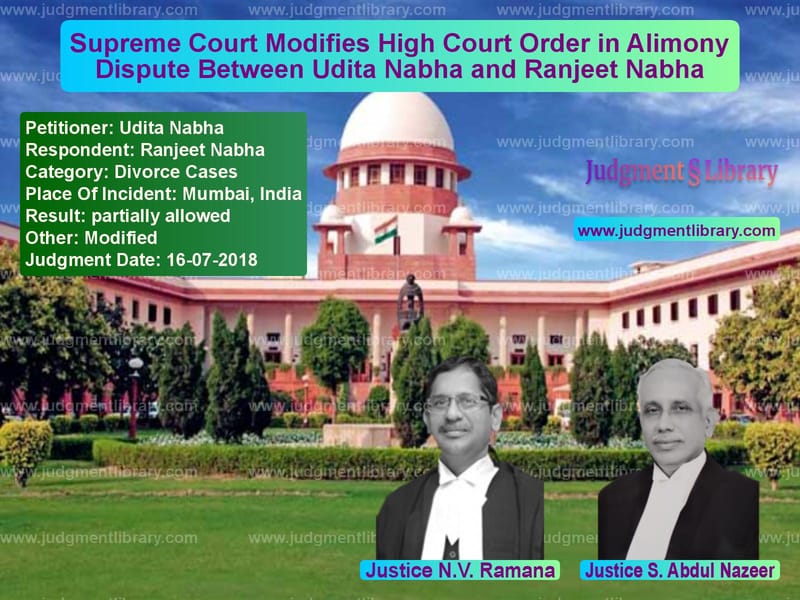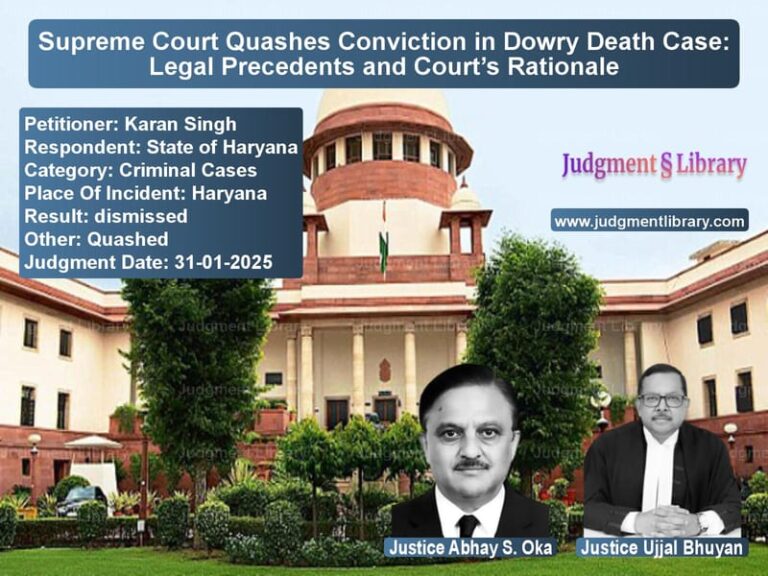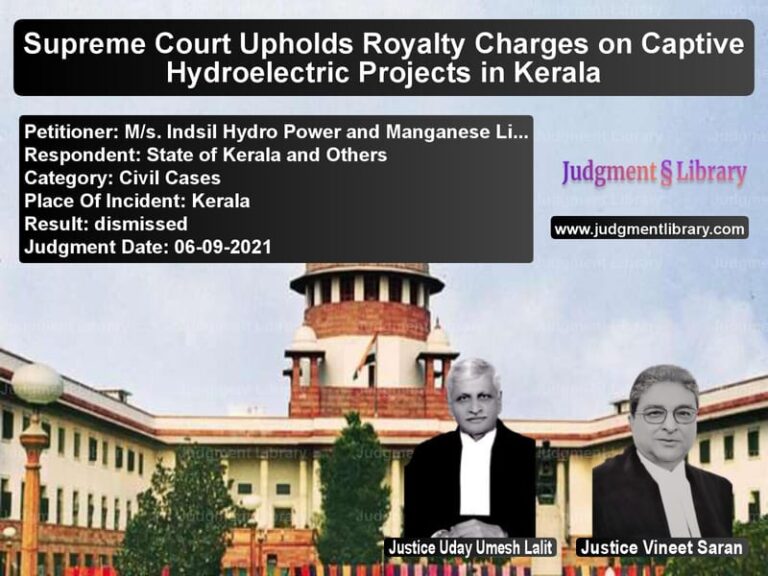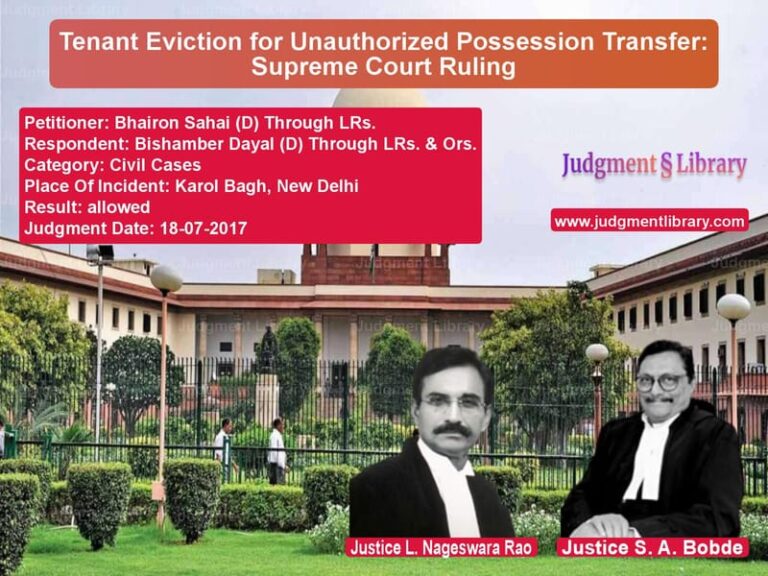Supreme Court Modifies High Court Order in Alimony Dispute Between Udita Nabha and Ranjeet Nabha
The Supreme Court of India, in the case of Udita Nabha vs. Ranjeet Nabha, ruled on an important dispute concerning alimony and financial support during pending divorce proceedings. The judgment addressed the issue of interim financial assistance to the appellant (wife) and her minor daughter while the appeal against the divorce decree was still pending in the Bombay High Court.
Background of the Case
Udita Nabha and Ranjeet Nabha were married under the Special Marriage Act, 1954, in 1995 and had a daughter in 2003. Due to marital discord, the wife filed for divorce in the Family Court at Mumbai, seeking dissolution of the marriage under Section 27(1)(d) of the Special Marriage Act, 1954. Along with her divorce petition, she also sought permanent alimony of Rs. 30 crores and interim maintenance of Rs. 3,50,000 per month for herself and Rs. 2,50,000 per month for her minor daughter.
The Family Court, by an order dated October 21, 2013, partially allowed the wife’s application and directed the husband to pay:
- Rs. 2,00,000 per month for the wife.
- Rs. 1,00,000 per month for the minor daughter.
The Family Court, in its final order on September 14, 2015, granted the divorce and awarded permanent alimony:
- Rs. 6 crores for the wife.
- Rs. 5 crores for the minor daughter.
- Out of the Rs. 5 crores for the child, Rs. 3.5 crores was to be placed in a fixed deposit for five years, accessible only with court permission.
Both parties appealed the Family Court’s decision in the Bombay High Court. The husband sought a reduction or stay on the alimony payments, while the wife sought permission to withdraw a portion of the deposited amount for her maintenance.
Key Legal Issues Considered
- Whether the High Court erred in imposing stringent conditions on the withdrawal of the deposited alimony amount.
- Whether the appellant (wife) was entitled to receive a portion of the alimony immediately for her sustenance and that of her child.
- The balance between protecting the rights of the judgment debtor (husband) and ensuring financial security for the appellant (wife).
Arguments Presented
Arguments by the Appellant (Udita Nabha)
- The appellant contended that her financial condition had worsened due to the prolonged legal battle and she required immediate financial assistance.
- She argued that the High Court’s conditions for withdrawal were unreasonable, as they did not account for her present financial hardships.
- Despite being awarded permanent alimony, she was receiving only Rs. 29,000 per month instead of the initially granted interim maintenance of Rs. 3,00,000 per month.
- She sought immediate withdrawal of Rs. 8.25 crores to sustain herself and provide for her minor daughter’s education and well-being.
Arguments by the Respondent (Ranjeet Nabha)
- The respondent argued that the appellant had adequate financial means and did not require additional withdrawals at this stage.
- He contended that he was already providing financial assistance for their daughter’s education and basic needs.
- The respondent insisted that any large withdrawals should be subject to judicial supervision to prevent potential misuse of funds.
Supreme Court’s Observations
The Supreme Court noted that the Family Court had already recognized the financial needs of the wife and child while granting permanent alimony. The Court emphasized the importance of balancing the interests of both parties, ensuring that the appellant was not left without financial support during the pending appeal.
The Court ruled:
“We deem it appropriate to modify the order of the High Court to the extent that the appellant (wife) be allowed to withdraw Rs. 2 crores during intra-appeal as an interim measure.”
The Court further directed that the Bombay High Court should expeditiously dispose of the pending appeals.
Final Judgment
The Supreme Court ruled:
- The appellant (wife) is permitted to withdraw Rs. 2 crores from the deposited amount as an interim measure.
- The remaining amount remains subject to the final decision of the Bombay High Court.
- The High Court is directed to hear and decide the appeals expeditiously.
- The Supreme Court clarified that it had not expressed any opinion on the merits of the case.
Impact of the Judgment
This ruling has significant implications for alimony disputes and financial relief in pending divorce cases:
- Immediate Financial Assistance: The judgment ensures that a spouse seeking maintenance is not left in financial distress during prolonged legal battles.
- Judicial Balancing: The ruling balances the husband’s financial obligations with the wife’s legitimate financial needs.
- Precedent for Future Cases: The decision establishes that in cases where large sums are deposited as alimony, courts should allow reasonable withdrawals while appeals are pending.
- Timely Resolution: The Supreme Court’s directive for expeditious disposal underscores the need to resolve financial disputes efficiently.
Legal Precedents Considered
The Supreme Court’s ruling aligns with previous judgments where courts have emphasized the importance of financial security for dependent spouses. Some relevant precedents include:
- Kusum Sharma vs. Mahinder Kumar Sharma (2020) – Guidelines on maintenance and alimony, stressing that dependent spouses should not be left financially vulnerable.
- Kalyan Dey Chowdhury vs. Rita Dey Chowdhury (2017) – The Court held that the amount of maintenance should be fair and just, ensuring a comparable standard of living.
- Rajnesh vs. Neha (2020) – The Court emphasized that interim maintenance should be sufficient for the recipient spouse’s basic needs.
Conclusion
The Supreme Court’s decision in Udita Nabha vs. Ranjeet Nabha highlights the judiciary’s commitment to ensuring financial stability for spouses seeking alimony. By modifying the High Court’s order and allowing an interim withdrawal of Rs. 2 crores, the Court reinforced the principle that financial support should be provided in a timely manner. This ruling sets an important precedent for handling alimony disputes, ensuring fairness and efficiency in legal proceedings.
Petitioner Name: Udita Nabha.Respondent Name: Ranjeet Nabha.Judgment By: Justice N.V. Ramana, Justice S. Abdul Nazeer.Place Of Incident: Mumbai, India.Judgment Date: 16-07-2018.
Don’t miss out on the full details! Download the complete judgment in PDF format below and gain valuable insights instantly!
Download Judgment: Udita Nabha vs Ranjeet Nabha Supreme Court of India Judgment Dated 16-07-2018.pdf
Direct Downlaod Judgment: Direct downlaod this Judgment
See all petitions in Alimony and Maintenance
See all petitions in Child Custody
See all petitions in Judgment by N.V. Ramana
See all petitions in Judgment by S. Abdul Nazeer
See all petitions in partially allowed
See all petitions in Modified
See all petitions in supreme court of India judgments July 2018
See all petitions in 2018 judgments
See all posts in Divorce Cases Category
See all allowed petitions in Divorce Cases Category
See all Dismissed petitions in Divorce Cases Category
See all partially allowed petitions in Divorce Cases Category







